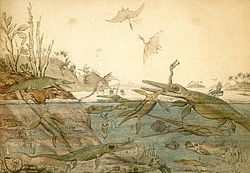History of paleontology

Paleontology is the study of fossils, or pieces of plants or animals that have been preserved in rocks or other materials over many years. People who study fossils are called paleontologists. Paleontology is a very old science, with fossils being studied for thousands of years. One of the earliest people to study fossils was a scientist from ancient Greece named Aristotle. In the past, people thought fossils were animals or plants that had been turned to stone when Noah's Flood happened. Over time, more people started to realize that these fossils were actually the remains of animals or plants that had lived in the distant past, long before humans existed. Later, in the 1600s, some of the first people to study fossils in a more scientific way were the great thinkers from the Enlightenment, like Isaac Newton. During the 1700s and 1800s, lots of new fossils were discovered, which helped people learn more about life in the ancient past. Today, paleontologists use both fossils and other clues to try to understand what life was like in the past, and how it's changed over time.
